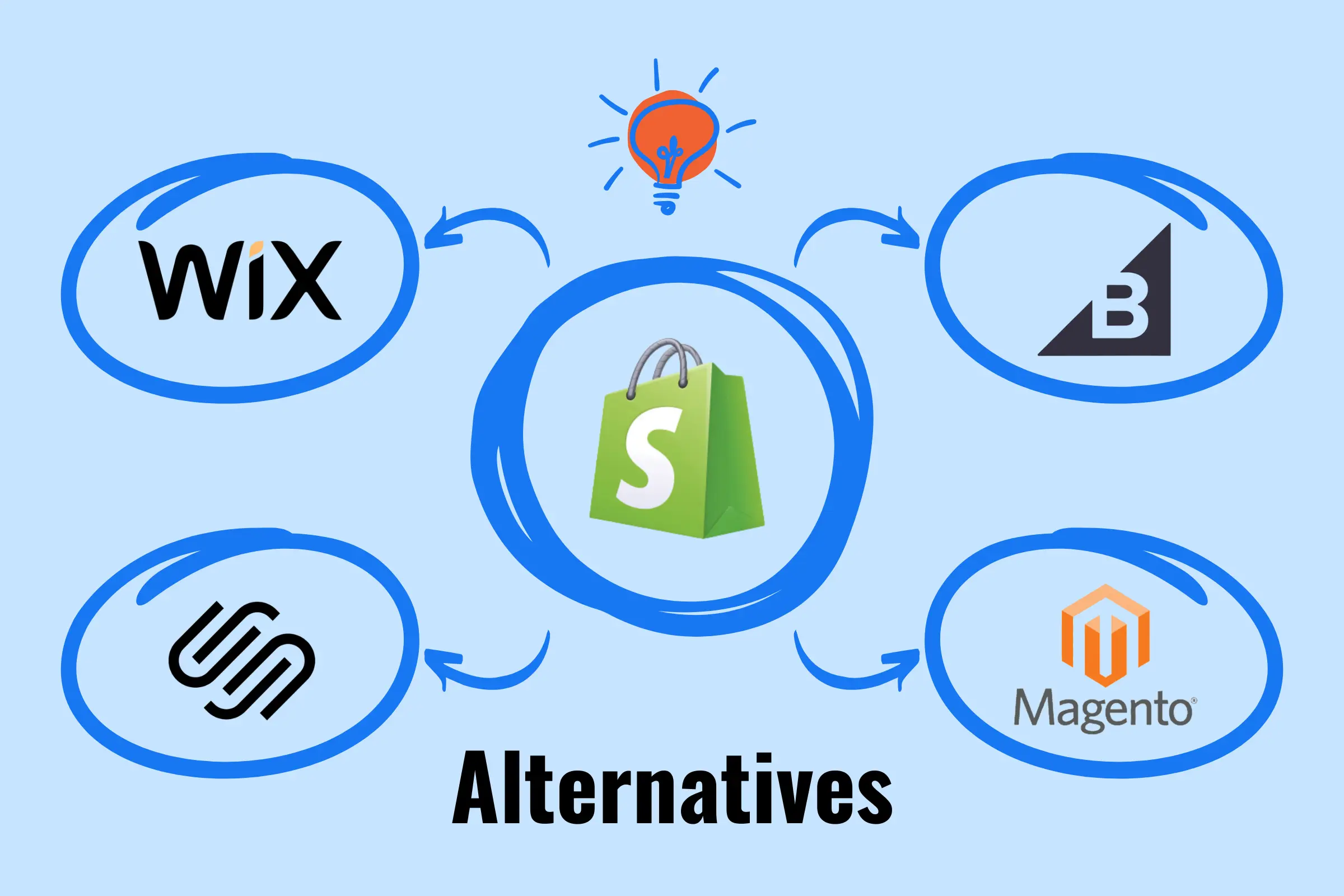Best Shopify Competitors to Consider in 2024 (Ultimate Compression)
Tired of Shopify? The online shopping world is changing, and new platforms are rising to the challenge. In 2024, there are many great alternatives to Shopify, including Shopify Competitors, websites like Shopify, and Shopify alternatives, each with its strengths and weaknesses. Whether you want more control over your store, better prices, or powerful marketing tools, there’s an option out there that’s perfect for you. This guide will explore the top Shopify competitors, helping you find the best fit for your business and stay ahead of the curve.
What is Shopify?
Shopify is a popular e-commerce platform that helps businesses easily create and manage online stores. It’s like a one-stop shop for building your online storefront, handling inventory and payments, and even marketing your products.
- Easy to use: No coding required, drag-and-drop interface.
- Customization: Choose from various themes and apps to personalize your store.
- Scalability: Can grow with your business, from small startups to large enterprises.
- Features: Includes inventory management, marketing tools, payment processing, and more.
- Pricing: Plans start from $29/month, with additional fees for apps and transactions.
Alternatives exist! Shopify might be a popular e-commerce platform, but the online marketplace is buzzing with options! Looking for more control over your store, budget-friendly solutions, or powerful marketing tools? In 2024, there’s a vast array of Shopify alternatives out there, each with unique strengths. Think of this guide as your compass, guiding you through the top competitors and helping you find the perfect platform to propel your online business to new heights. Ready to explore the exciting world beyond Shopify? Dive in!
Must Read: Micro SaaS Ideas
Best 8 Shopify Competitors/Alternatives for E-commerce Owners
Here are the Best 8 Shopifcusty Competitors/Alternative for E-commerce Owners, lets get into details.
Wix

Wix is a website builder platform designed to make creating and managing websites accessible to everyone, even those with no coding experience. It offers a drag-and-drop interface for building your website visually, using pre-designed templates and elements. They also boast a large library of apps and integrations for adding various features to your site.
Here are some key points about Wix:
Strengths:
- Easy to use: No coding required, great for beginners.
- Visually appealing: Wide range of templates and design options.
- Scalable: Can grow with your needs, from simple blogs to complex online stores.
- Feature-rich: Offers marketing tools, SEO tools, analytics, and more.
- Free plan available: Start for free, and upgrade with more features when needed.
Things to consider:
- Limited customization: Templates offer some flexibility, but advanced customization might be limited.
- Transaction fees: Free plan has limitations, and paid plans have transaction fees.
- Not ideal for complex sites: Might not be the best choice for highly technical websites.
Squarespace

Squarespace is an American website builder and hosting platform founded in 2004. Primarily known for its user-friendly interface and stylish templates, it caters to individuals and businesses seeking to establish an online presence without requiring coding expertise.
Strengths:
- User-Friendly & Visually Appealing: Squarespace shines with its intuitive drag-and-drop interface and stunning template library. Even beginners can create professional-looking websites without coding knowledge.
- All-in-One Solution: Simplify website creation and management with features like domain registration, hosting, email marketing, and analytics all seamlessly integrated into one platform.
Things to Consider:
- Limited Customization: While offering flexibility, Squarespace might not cater to highly specific design needs compared to custom-coded websites.
- Transaction Fees: E-commerce plans incur transaction fees on sales, which can add up depending on your volume. Consider this when budgeting.
WooCommerce

WooCommerce is a popular open-source eCommerce plugin specifically designed for WordPress websites. Essentially, it allows you to transform your existing WordPress site into a fully functional online store, complete with all the features you’d expect:
- Product listings: Add detailed descriptions, images, and variations, and manage inventory.
- Shopping cart and checkout: Securely process payments through various gateways and offer flexible shipping options.
- Order management: Track orders, fulfill them, and manage customer inquiries.
- Customization: Tailor your store’s look and feel with themes and plugins.
- Scalability: Start small and expand your store as your business grows.
Here are some key benefits of using WooCommerce:
- Free and open-source: The core plugin is free, making it an accessible option for beginners and budget-conscious entrepreneurs.
- Flexibility: With a wide range of themes and plugins available, you can create a store that perfectly reflects your brand and needs.
- Ease of use: The interface is generally considered user-friendly, even for those without extensive coding experience.
- Large community: You’ll find a wealth of resources, tutorials, and support from the active WooCommerce community.
Must Read: Instagram for PR: The Game-Changer in Public Relations
BigCommerce

BigCommerce is a leading e-commerce platform that empowers businesses of all sizes to build, innovate, and grow their online stores. It is a Software as a Service (SaaS) solution, meaning that you don’t need to install or manage any software yourself – BigCommerce takes care of everything for you.
Here are some of the key features of BigCommerce:
- Easy to use: Even if you have no technical experience, you can create a beautiful and functional online store with BigCommerce. The platform is drag-and-drop, so you can easily add products, images, and text to your pages.
- Scalable: BigCommerce can grow with your business. The platform offers a variety of plans to fit your needs, and you can easily upgrade as your business grows.
- Powerful features: BigCommerce comes with a wide range of features, including:
- SEO tools to help you get your store found in search engines
- Marketing tools to help you promote your products and reach new customers
- Payment processing to make it easy for customers to buy from you
- Shipping tools to help you manage your shipping costs
- Analytics to help you track your store’s performance
- Open API: BigCommerce has an open API, which allows you to integrate your store with a wide range of third-party apps and services.
Overall, BigCommerce is a powerful and versatile e-commerce platform that is a great option for businesses of all sizes.
Here are some additional things to keep in mind about BigCommerce:
- Pricing: BigCommerce offers a variety of plans, starting at $29 per month. The price of your plan will depend on the features you need and the number of products you sell.
- Free trial: BigCommerce offers a 15-day free trial, so you can try out the platform before you commit to a paid plan.
- Customer support: BigCommerce offers 24/7 customer support by phone, email, and live chat.
Magento

Magento is an open-source e-commerce platform written in PHP that allows businesses to create online stores. It is a powerful and flexible platform that can be used to sell a wide variety of products and services. Magento is now owned by Adobe and is known as Adobe Commerce.
Here are some of the key features of Magento:
- Scalability: Magento can be used to create small online stores with just a few products, or large enterprise-level stores with thousands of products.
- Flexibility: Magento can be customized to meet the specific needs of any business. There are thousands of extensions and themes available to add new features and functionality.
- SEO: Magento is built with search engine optimization (SEO) in mind, which can help businesses improve their ranking in search results.
- Marketing tools: Magento includes a number of marketing tools, such as email marketing, coupon codes, and gift certificates.
- Analytics: Magento provides detailed analytics that can help businesses track their sales and website traffic.
Magento is a popular choice for businesses of all sizes, but it is important to note that it can be more complex to set up and use than some other e-commerce platforms. If you are considering using Magento, it is important to do your research and make sure that it is the right platform for your needs.
Here are some of the pros and cons of using Magento:
Pros:
- Scalable and flexible
- Powerful features
- Large community and support
Cons:
- Can be complex to set up and use
- Requires technical expertise
- Can be expensive
BigCartel

Big Cartel is an e-commerce platform specifically designed for artists and makers to sell their creations online. Founded in 2005, it has empowered over a million creators to sell their products, including:
- T-shirts
- Art
- Clothing
- Merch
- Prints
- Jewelry
- And more!
Key features of Big Cartel:
- Easy to use: The platform is known for its user-friendly interface and simple setup process, making it perfect for beginners.
- Free plan: You can create a basic online store with up to 5 products for free. Paid plans offer more features and product capacity.
- Customization: Choose from a variety of free themes or code your own unique design to create a store that reflects your brand.
- Selling tools: Manage inventory, accept payments, track orders, and run promotions – all from your Big Cartel dashboard.
- Mobile-friendly: Your store will look great and function smoothly on all devices.
Here are some of the pros and cons of using Big Cartel:
Pros:
- Easy to use and set up
- Free plan available
- Mobile-friendly
- Good for selling physical products
- Strong community of artists and makers
Cons:
- Limited features compared to some other e-commerce platforms
- Not ideal for selling complex products or services
- Transaction fees (unless you upgrade to a paid plan)
Sellfy

Sellfy is an all-in-one ecommerce platform designed specifically for creators to sell digital and physical products, subscriptions, and print-on-demand merchandise online. It’s known for its user-friendly interface and ease of use, making it a popular choice for beginners and established creators alike.
Here are some of the key features of Sellfy:
- Sell a variety of products: Sell digital downloads, physical products, subscriptions, and print-on-demand merchandise.
- Easy to use: Create a beautiful online store in minutes, even if you have no coding experience.
- Secure payments: Sell with confidence knowing that your customers’ payments are securely processed.
- Marketing tools: Built-in marketing tools to help you promote your products and reach new customers.
- Analytics: Track your sales performance and learn what’s working and what’s not.
- Integrations: Integrate Sellfy with popular tools like Mailchimp, Zapier, and Google Analytics.
Sellfy offers a free plan with limited features, as well as paid plans with more features and higher limits.
Whether you’re a musician, artist, writer, or any other type of creator, Sellfy can help you sell your products online and reach a wider audience.
Shift4Shop

Shift4Shop, formerly known as 3dcart, is a leading all-in-one e-commerce platform that empowers businesses of all sizes to create, manage, and grow their online stores. Founded in 1997, it’s a veteran in the e-commerce space, offering a comprehensive suite of features and tools to help businesses succeed in the digital marketplace.
Here’s a quick overview of what Shift4Shop offers:
- User-friendly website builder: With its drag-and-drop interface and library of customizable templates, Shift4Shop makes it easy for anyone to create a professional-looking online store, even without coding experience.
- Powerful e-commerce features: Manage your products, inventory, orders, and shipping effortlessly with Shift4Shop’s built-in tools. You’ll also have access to features like abandoned cart recovery, product reviews, and coupons to boost your sales.
- Scalability and flexibility: As your business grows, Shift4Shop can grow with you. The platform offers a variety of plans to fit your needs, and its APIs allow you to integrate with a wide range of third-party apps and services.
- Marketing and SEO tools: Drive traffic to your store and improve your search engine ranking with Shift4Shop’s built-in marketing tools. You can create email campaigns, manage your social media presence, and run targeted ads.
- Security and reliability: Shift4Shop is committed to protecting your store and your customers’ data. The platform is PCI-compliant and offers some security features to keep your store safe.
- 24/7 customer support: Get help when you need it with Shift4Shop’s responsive customer support team. They’re available 24/7 by phone, email, and live chat.
Here are some of the pros and cons of using Shift4Shop:
Pros:
- Affordable pricing, especially for the free plan
- Feature-rich platform with a wide range of tools
- User-friendly interface and easy to use
- Scalable and flexible to grow with your business
- 24/7 customer support
Cons:
- Some features may require additional apps or paid upgrades
- Can be overwhelming for beginners with its wide range of features
- Not as well-known as some other e-commerce platforms
Which Shopify alternative should you use?
Leaving Shopify? Don’t fret! A world of e-commerce awaits. But where to start? Buckle up, because choosing the right platform depends on your business journey:
Beginner’s Quest:
- Squarespace: Easy website builder, perfect for creatives and small businesses.
- Wix: Drag-and-drop magic, ideal for showcasing products and services.
- Ecwid: Free plan lets you dip your toes in, perfect for testing the waters.
Growth Guru:
- WooCommerce: Turns your WordPress site into an online store, ideal for tech-savvy users.
- BigCommerce: Scalable powerhouse, great for handling high-volume sales.
- Volusion: Omnichannel champion, ideal for connecting online and offline stores.
Tech Titan:
- Shift4Shop: Feature-packed and customizable, ideal for businesses with specific needs.
- Magento: Enterprise-level muscle, best for large businesses with complex demands.
Remember, consider your budget, tech skills, and growth plans. Each platform offers a unique blend of features and pricing. Research, compare, and don’t be afraid to experiment! Happy selling!
Conclusion
So, there you have it! If you’re feeling a bit worn out by Shopify or just want to explore other options, don’t sweat it! The world of online selling has loads of Shopify competitors and websites like Shopify waiting for you, each with its perks and quirks. Whether you’re just starting out and want something super easy like Squarespace, or you’re a pro looking for total customization with Shift4Shop, there’s a platform out there with your name on it. Just remember to think about stuff like how much you want to spend, how tech-savvy you are, and where you see your business going. Take your time, do some digging, and don’t be afraid to try new things. Who knows? Your next big e-commerce adventure might be just around the corner! Happy selling, folks!







